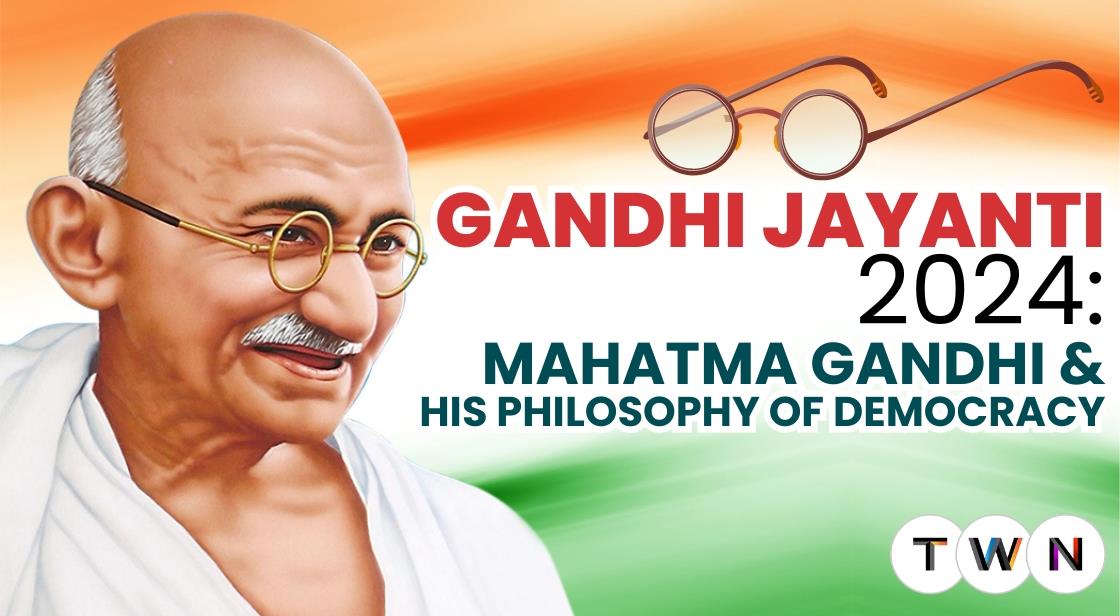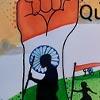Gandhi Jayanti 2024: Mahatma Gandhi and his Philosophy of Democracy

Blog Post
Gandhi Jayanti, celebrated on October 2nd every year, is a day of profound significance in India and around the world. It marks the 155th Birth Anniversary of Mohandas Karamchand Gandhi, fondly known as Mahatma Gandhi, Bapu, or the Father of the Nation.
On this auspicious occasion, we delve into the timeless and impactful philosophy of Mahatma Gandhi, particularly exploring his profound ideas on democracy.
Amidst the celebrations and remembrance of Gandhiji's legacy, it is crucial to reflect on the philosophical foundations that have made him an enduring figure in history. Mahatma Gandhi was not only a leader of India's struggle for independence but also a profound philosopher whose ideas continue to shape the world.
His philosophy of democracy, rooted in principles of truth, non-violence, and swaraj (self-rule), is a testament to his visionary thinking.
In a world grappling with diverse political ideologies, Gandhi's approach to democracy stands out as a beacon of wisdom and relevance. As nations face contemporary challenges of inequality, environmental degradation, and divisive politics, the principles of simplicity, sustainability, and inclusivity advocated by Gandhi provide profound insights.
"I understand democracy as something that gives the weak the same chance as the strong." - M K Gandhi
This blog post is a journey into the profound insights of Mahatma Gandhi, examining how his philosophy of democracy is not confined to a specific era but resonates across the global landscape.
From his vision of Sarvodaya and Gram Swaraj to the essence of non-violence and his blueprint for inclusive democracy, each aspect offers valuable lessons for the complexities of modern society.
Gandhi's principles of collective effort, civic responsibility, and the focus on cleanliness align seamlessly with the theme, embodying the spirit of unity in action.
Join us in this exploration of Mahatma Gandhi's enduring philosophy of democracy, understanding how his principles offer not just historical wisdom but a guiding light for contemporary societies navigating the intricate challenges of the 21st century.
#RoleOfMahatmaGandhiInFreedomStruggle #GandhiJi #SwachhBharatAbhiyan
#IndependenceDay2024 #AmritKaal #AzadiKaAmritMahotsav
#GandhiYug #MahatmaGandhi #IndianIndependenceMovement
Mahatma Gandhi, the father of the Indian nation, was not only a leader of India's struggle for independence but also a profound philosopher whose ideas continue to shape the world. Among his many ideologies, his philosophy of democracy stands as a testament to his visionary thinking. In a world grappling with diverse political ideologies, Gandhi's approach to democracy remains relevant and impactful.
Mahatma Gandhi was one of the most influential figures in the history of democracy. His philosophy of democracy was based on the principles of truth, non-violence, and swaraj (self-rule). Gandhi believed that democracy should be a participatory system where all citizens have a voice in decision-making.
Gandhi's ideas about democracy are still relevant today.
We live in a world where democracy is under threat from authoritarian regimes and other forces. Gandhi's philosophy can help us to defend democracy and to build more just and equitable societies.
Gandhi Jayanti 2024 - Mahatma Gandhi and his Philosophy of Democracy
Explore the profound insights of Mahatma Gandhi as we delve into his philosophy of democracy, understanding how his principles are not confined to a specific era but resonate across the global landscape.
Gandhi's Principles of Democracy
-
Truth: Gandhi believed that democracy should be based on truth and honesty. He argued that if politicians and citizens are not truthful, then democracy cannot function properly.
-
Non-violence: Gandhi believed that non-violence is the only way to achieve lasting social change. He argued that violence only breeds more violence, and that it is ultimately self-defeating.
-
Swaraj: Gandhi believed that swaraj, or self-rule, is the ultimate goal of democracy. He argued that people should be free to govern themselves without interference from outside forces.
Understanding Gandhi's Concept of Democracy: A Vision Rooted in Sarvodaya
Gandhi's profound vision of democracy transcended the conventional political framework; instead, it was intricately interwoven with the ideals of Sarvodaya, a concept embodying the welfare and upliftment of all. His perspective on democracy was not confined to a mere governance structure; rather, it was a comprehensive way of life with a paramount focus on empowering every individual.
Democracy as a Way of Life: For Gandhi, democracy was not a standalone political system but a holistic approach to living. He envisioned a society where democratic principles permeated every facet, fostering an environment where individuals actively participated in the collective well-being. In his words, "A true democracy is that which promotes the welfare of the weakest."
Sarvodaya: Welfare for All: At the core of Gandhiji's democratic vision was Sarvodaya, meaning the "upliftment of all." He advocated for a society where the progress and prosperity of the weakest members were prioritized. His emphasis on Sarvodaya went beyond economic considerations, encompassing social, moral, and spiritual dimensions.
Empowerment of the Weakest: Gandhiji's democratic ethos placed a special emphasis on the empowerment of the weakest sections of society. He believed that the true measure of a democratic society lay in its ability to uplift and provide opportunities for those who were often marginalized. In this context, he asserted, "A nation's greatness is measured by how it treats its weakest members."
Holistic Well-Being: Unlike a narrow focus on political structures, Gandhiji's vision of democracy extended to the holistic well-being of individuals. He envisioned a society where people actively engaged in self-improvement, contributing not only to their personal growth but also to the collective advancement of the community.
Individual Empowerment: In Gandhiji's democratic framework, the empowerment of every individual was paramount. He believed in nurturing a sense of responsibility and self-reliance among citizens. "Democracy must, in essence, therefore, mean the art and science of mobilizing the entire physical, economic, and spiritual resources of all the various sections of the people in the service of the common good," he remarked.
A Higher Purpose: For Gandhiji, democracy served a higher purpose beyond governance- it was a means to achieve a just and equitable society. His democratic principles were infused with a moral imperative, emphasizing the importance of truth, non-violence, and justice in the conduct of individuals and the nation.
Also Read : Inspiring Quotes by Mahatma Gandhi as Eternal Wisdom for Today's Entrepreneurs
Decentralization and Gram Swaraj: Gandhi's Vision for Local Autonomy
Gandhi's visionary principles encompassed the pivotal idea of decentralization, with the concept of Gram Swaraj, or village self-governance, standing at its core. For him, the key to true democracy lay in the empowerment of local communities, emphasizing the significance of decision-making authority residing at the grassroots level.
Decentralization as Fundamental:
Gandhi advocated for the decentralization of power as a fundamental principle of effective governance. He believed that concentrating power in a centralized authority could lead to alienation and a detachment of governance from the lived realities of the people. Decentralization, according to him, was imperative for ensuring participatory democracy.
"Centralization as a system is inconsistent with the real needs of India and, in a lesser degree, of any other country in Asia."
Gram Swaraj:
Village Self-Governance: At the heart of Gandhi's vision was the concept of Gram Swaraj, which translates to village self-governance. He envisioned villages as self-reliant units capable of managing their affairs. Gram Swaraj aimed at empowering local communities to govern themselves, fostering autonomy and a sense of responsibility among villagers.
"The true India is to be found not in its few cities, but in its 700,000 villages. We must remove the disease from the villages. The disease of exploitation. Gram Swaraj is our goal."
Local Autonomy for True Democracy:
Gandhi firmly believed that genuine democracy could only thrive when decision-making power was vested in the hands of the people at the grassroots level. Local autonomy was, therefore, a cornerstone of his democratic ideals. This, he argued, would lead to a more responsive and accountable form of governance.
"Real Swaraj will come not by the acquisition of authority by a few but by the acquisition of the capacity by all to resist authority when it is abused."
Empowering Rural Communities:
The emphasis on Gram Swaraj was not just a political doctrine for Gandhi; it was a social and economic imperative. He envisioned rural communities as self-sufficient entities, capable of addressing their needs without depending on external forces. Empowering villages, according to him, was key to alleviating poverty and fostering overall development.
"The ideally conducted village is a composite picture of simplicity, self-reliance, and cooperative effort."
Participatory Democracy at the Grassroots:
Gandhi's vision went beyond a theoretical endorsement of decentralization; he actively promoted participatory democracy at the grassroots level. He envisaged a scenario where every individual in the village had a say in the decision-making process, ensuring that governance truly reflected the will of the people.
"It is Swaraj when we learn to rule ourselves."
Learning from the Village:
Gandhi saw the village as a repository of wisdom and values. He believed that urban centers could learn from the self-sufficiency, simplicity, and cooperative spirit of villages. The principles of Gram Swaraj, for him, held the key to a harmonious and sustainable society.
Also Read : Exploring the Cultural Splendors of Incredible India
Non-violence as the Essence of Democracy: Gandhi's Paradigm of Ahimsa
At the heart of Gandhi's profound philosophy stood the bedrock principle of non-violence, or 'Ahimsa.' His vision of democracy was intricately woven with this ethical tenet, portraying a society where conflicts found resolution through dialogue and understanding rather than coercion. For Gandhi, non-violence was not merely a political strategy; it was, in essence, the very soul of a democratic society.
1. Ahimsa as a Guiding Light: Gandhi considered non-violence not just as a passive resistance tactic but as a dynamic force that could transform individuals and societies. For him, Ahimsa was a guiding light that illuminated the path towards a just and compassionate democracy.
"Non-violence is the greatest force at the disposal of mankind. It is mightier than the mightiest weapon of destruction devised by the ingenuity of man."
2. Resolution of Conflicts Through Dialogue: In Gandhi's democratic vision, conflicts were not to be settled through force or domination. Instead, he advocated for a process of dialogue and understanding. Non-violence, in this context, meant addressing disagreements through open communication and finding common ground through empathy.
"A 'No' uttered from deepest conviction is better and greater than a 'Yes' merely uttered to please, or what is worse, to avoid trouble."
3. Beyond Political Strategy: While Gandhi employed non-violence as a powerful political strategy in various movements, including the Indian independence struggle, he considered it beyond a mere tactical tool. Non-violence, for him, was a way of life, an ethos that should permeate every aspect of human existence.
"Non-violence is not a garment to be put on and off at will. Its seat is in the heart, and it must be an inseparable part of our very being."
4. The Soul of Democracy: In the realm of governance, Gandhi envisioned non-violence as the soul of democracy. He believed that a democratic society could only be truly just and sustainable when founded on the principles of compassion, respect, and non-coercion. Non-violence, according to him, was the cornerstone of a genuinely democratic ethos.
"Democracy and violence can ill go together. Evolution of democracy is not possible if we are not prepared to hear the other side."
5. Building a Culture of Empathy: For Gandhi, non-violence was not just the absence of physical harm; it encompassed a broader spectrum of empathy and understanding. He aimed at building a culture where individuals respected each other's perspectives, fostering an environment conducive to the flourishing of democracy.
6. Ahimsa in Decision-Making: In the democratic decision-making process, Gandhi envisioned the application of non-violence. This meant that policies and actions should be guided by a commitment to avoid harm and coercion. In a truly democratic society, decisions would be reached through consensus and without resorting to force.
7. Global Relevance of Ahimsa: Gandhi's philosophy of non-violence transcended borders and cultures. He believed that Ahimsa had universal applicability and could serve as a guiding principle for nations across the world. In the context of democracy, this principle emphasized the necessity of respectful dialogue in global affairs.
"Non-violence is the first article of my faith. It is also the last article of my creed."
Inclusivity and Social Justice: Gandhi's Blueprint for Democratic Equality
Gandhi's vision of democracy was not confined to a mere political framework; it was, at its core, a call for inclusivity and social justice. The contours of his democratic philosophy extended far beyond political representation, aiming for the upliftment of marginalized sections and the establishment of true social equity. Through his principles and actions, Gandhi painted a vivid blueprint for a democracy that ensured equal opportunities for all.
1. Equality Beyond Politics: For Gandhi, the essence of democracy lay in its ability to ensure equality for every individual, transcending political realms. His vision demanded a society where every citizen, regardless of background or social standing, had equal access to opportunities and rights.
"I want the cultures of all the lands to be blown about my house as freely as possible. But I refuse to be blown off my feet by any."
2. Upliftment of the Marginalized: A cornerstone of Gandhi's democratic ethos was the upliftment of the marginalized, including the untouchables. He worked tirelessly to dismantle caste-based discrimination, envisioning a society where every individual, irrespective of their birth, could lead a life of dignity and opportunity.
3. Social Justice as a Pillar: Gandhi emphasized that true democracy could not exist without a robust foundation of social justice. It was not merely about political representation but ensuring that every facet of society, from economic opportunities to educational access, was structured to eliminate disparities and empower the disadvantaged.
4. Beyond Token Representation: While political representation was acknowledged, Gandhi's vision of inclusivity transcended tokenism. He advocated for meaningful participation and engagement of all sections of society in decision-making processes. His focus was on fostering a democratic culture where diverse voices were not just heard but actively contributed to the nation's progress.
"You must be the change you want to see in the world."
5. Equal Opportunities for All: Central to Gandhi's democratic vision was the idea that democracy should not be a privilege of a few but a right for all. He aimed at creating a society where opportunities were not limited by socio-economic factors, ensuring that every individual had the chance to develop their potential to the fullest.
"The best way to find yourself is to lose yourself in the service of others."
6. Dismantling Discrimination: Gandhi's fight against untouchability was not just a political agenda; it was a moral imperative. He believed that a truly democratic society could only emerge when deeply entrenched discriminatory practices were dismantled, allowing every citizen to live with dignity and respect.
"You can chain me, you can torture me, you can even destroy this body, but you will never imprison my mind."
7. Grassroots Empowerment: In Gandhi's vision, social justice was not a top-down endeavor; it needed to be rooted in grassroots empowerment. He believed in building communities where individuals actively participated in shaping their destinies, ensuring that the benefits of democracy reached the furthest corners of society.
8. Legacy of Inclusive Democracy: Gandhi's legacy in promoting inclusivity and social justice continues to resonate globally. His principles serve as a timeless guide for nations striving to build democracies that genuinely embrace diversity, eradicate discrimination, and provide equal opportunities for every citizen.
"The true measure of any society can be found in how it treats its most vulnerable members."
Mahatma Gandhi's Perspective on Democracy: A Path of Discussion and Tolerance"
Gandhi's Definition of Democracy:
Abraham Lincoln's famous definition, "government of the people, by the people, for the people," resonated with Gandhi. He added depth, stating that a democratic structure should not only be elected but must also reflect the people's will in both its constitution and day-to-day functioning.
Involvement in Decision-Making:
Democracy, according to Gandhi, involves the active participation of a large number of people in decision-making. The political authority stems from the collective will of individuals cooperating to make decisions binding on the entire community.
Challenges in Democracy:
Recognizing the dangers inherent in any institution, Gandhi acknowledged the potential abuse in democracy. His solution was not to avoid democracy but to minimize the possibility of misuse. He cautioned against the peril of mob rule, where a slim majority could strip the rights of the minority.
Majority Rule and Opposition:
Gandhi observed that democracy guided solely by majority rule might suppress opposition, hindering the spirit of free speech. He emphasized the importance of a formidable opposition, echoing Benjamin Disraeli's view that a government's security depends on a robust opposition.
Gandhi's Approach to Opposition:
Contrary to violent displays of opinion, Gandhi advocated "sweet persuasion." He believed in patiently converting opponents, fostering consensus through reasoned dialogue. Anger, he argued, reflected intolerance, and the capacity to bear criticism was crucial for public life.
Democracy as 'Government by Discussion':
The concept of democracy as "government by discussion" aligns with the idea that individual values can evolve through the decision-making process. Public discussion and interactive reasoning, integral to democracy, foster a space for diverse opinions and evolving perspectives.
Global Traditions of Public Discussion:
Gandhi's views on democracy resonate globally. Professor Amartya Sen noted the commitment to discussion in early Indian Buddhists, and Nelson Mandela highlighted the democratic essence in African meetings, where everyone had the freedom to voice their opinions.
Relevance in Contemporary Times: Gandhi's Enduring Democratic Legacy
Gandhi's philosophy of democracy, crafted in the 20th century, resonates powerfully in the 21st century, offering a timeless guide for societies navigating the complexities of modern challenges. As the world grapples with issues of inequality, environmental degradation, and divisive politics, Gandhi's emphasis on simplicity, sustainability, and inclusivity emerges as a beacon of wisdom.
1. Addressing Inequality: In an era marked by widening socio-economic gaps, Gandhi's call for equality echoes with renewed vigor. His emphasis on ensuring equal opportunities for all, irrespective of socio-economic backgrounds, becomes a pertinent lens through which contemporary societies can reassess their commitment to social justice. The fight against discrimination, a central theme in Gandhi's philosophy, remains relevant in dismantling existing structures of inequality.
2. Environmental Sustainability: Gandhi's advocacy for simplicity and environmental consciousness aligns seamlessly with the modern global pursuit of sustainability. The 21st century grapples with environmental crises, and Gandhi's vision of harmonizing human existence with nature stands as a prescient call. His promotion of sustainable practices, minimalistic living, and respect for the environment provides a template for societies seeking a balance between progress and ecological well-being.
"Earth provides enough to satisfy every man's needs, but not every man's greed."
3. Inclusive Governance: As divisive politics dominates contemporary discourse, Gandhi's vision of inclusive governance gains newfound relevance. His concept of Gram Swaraj, or village self-governance, underscores the importance of local autonomy and community-driven decision-making. In an age where inclusivity is often sacrificed for political gains, Gandhi's call for decentralized power structures becomes a guide for fostering genuine democratic participation.
"Democracy must, in essence, therefore mean the art and science of mobilizing the entire physical, economic and spiritual resources of all the various sections of the people in the service of the common good of all."
4. Dialogue over Discord: Gandhi's unwavering commitment to non-violence and dialogue as instruments of change becomes a crucial lesson in an era marked by polarized narratives and global tensions. His philosophy challenges societies to engage in meaningful conversations, emphasizing understanding over coercion. In a world grappling with the consequences of divisive ideologies, Gandhi's advocacy for peaceful dialogue remains an invaluable lesson.
"Anger and intolerance are the enemies of correct understanding."
5. Empowerment Through Simplicity: The modern age is often characterized by excesses and a relentless pursuit of material wealth. Gandhi's philosophy of simplicity offers a counter-narrative, advocating for a life focused on essential needs rather than excessive desires. In an era grappling with the consequences of overconsumption, Gandhi's call for voluntary simplicity emerges as a sustainable path towards personal contentment and environmental harmony.
"Live simply so that others may simply live."
6. Global Citizenship: Gandhi's vision of democracy extended beyond national borders. In an era of interconnectedness and global challenges, his call for global citizenship and a sense of responsibility towards humanity gains prominence. His emphasis on building a world where every individual recognizes their interconnectedness and contributes to the well-being of the entire human family becomes a relevant paradigm for fostering global harmony.
Conclusion
Gandhiji's philosophy of democracy transcends the confines of its time, offering invaluable lessons for the challenges of contemporary society. As nations navigate the complexities of the 21st century, Gandhiji's enduring legacy serves as a guidepost, urging societies to prioritize equality, sustainability, and inclusive governance in their quest for a just and harmonious world.
You May Also Read
भारत की आजादी में महात्मा गांधी का योगदान, आइए आजादी की लड़ाई में महात्मा गांधी के विशिष्ट योगदान के बारे में जानते हैं
गांधी जयंती 2024: महात्मा गांधी और लोकतंत्र पर उनका विज़न
आजादी का अमृत महोत्सव- प्रगतिशील भारत की आजादी के 75 साल
आज जब पूरा देश आज़ादी का अमृत महोत्सव Azadi Ka Amrit Mahotsav मना रहा है, गांधी और उनके विचार बहुत ज्यादा प्रासंगिक हैं
#RoleOfMahatmaGandhiInFreedomStruggle #GandhiJi #SwachhBharatAbhiyan
#IndependenceDay2024 #AmritKaal #AzadiKaAmritMahotsav
#GandhiYug #MahatmaGandhi #IndianIndependenceMovement
You May Like
EDITOR’S CHOICE












